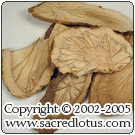Guang Fang Ji (Aristolochia Root, Stephania)
Herb 16 of 28 in Herbs that Regulate Water and Drain Dampness
Buy This Herb
Get free shipping from
our partners at CHD
our partners at CHD
Chinese Herb Actions
-
Expels Wind Damp Heat and Relieves Pain
For diffuse painful joints and achinesss due to Wind Damp or Wind Damp Heat. - Promotes Urination, Reduces Swelling
For dysuria, edema, and leg qi.
Chinese Herb Contraindications & Cautions
- Use with caution in cases with Yin Deficiency
- Use with caution in cases with Spleen and Stomach Deficiency and Cold
Herb-Drug Interactions
- This herb should not be used with other nephrotoxic or hepatotoxic compounds.
Chinese Herb Toxicity & Overdose
- This herb is banned due to its toxicity
- This herb contains aristolochic acid, a compound that can cause permanent kidney damage, including kidney failure. It has also been shown to cause cancer, specifically urothelial carcinoma.
- Position paper on the risks associated with the use of herbal products containing Aristolochia
European Medicines Agency (EMEA) - This herb is considered toxic.
(while some Chinese herbs are toxic, it must be noted that many come prepared, or are combined, to mitigate their toxicity)
Chinese Herb Dosage
- 4.5-9 grams in decoction 12
- 4.5-9 grams in decoction 13
Chinese Herb Notes
- Guang Fang Ji contains aristolochic acid, a known nephrotoxic compound. The traditional method of preparation (boiling in water) is believed to lower the toxicity since aristolochic acid has a low water solubility but extreme care should be taken.
- In Belgium, a weight loss clinic used a large dose of the raw powder along with acetazolamide and several other compounds resulting in at least 53 cases of renal fibrosis.
- See Eric Brand's blog post: Are You Using the Correct Fang Ji?
Chinese Herb Clinical Studies & Research
- Aristolochic acid has demonstrated anti-inflammatory actions by inhibiting prostaglandin synthesis.
McGuffin M, Hobbs C., et al. Botanical Safaety Handbook, CRC. Press, 1997; 131-132.
This Herb Appears in the Following Formulas:
- Xiao Xu Ming Tang (Minor Prolong Life Decoction)
Category: Formulas that Release Wind from the Skin and Channels - Xuan Bi Tang (Disband Painful Obstruction Decoction)
Category: Formulas that Dispel Wind-Dampness






